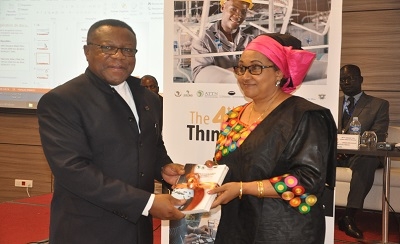
Abidjan, 08 April 2017 (ACBF) – Africa’s regional economic communities have key coordinating roles to play in support of the continent’s industrialization and transformation agenda but they are faced with acute capacity challenges to do this, warns a new report by the African Capacity Building Foundation – www.acbf-pact.org. The Report, launched at the 4th African Think Tank Summit is titled “Survey of the Capacity Needs of Africa’s Regional Economic Communities and Strategies for addressing them.”
It establishes that while notable progress have been recorded in certain areas, capacity interventions over the past years have been largely fragmented and reactive, and have therefore not been as effective as desirable in addressing the Regional Economic Communities’ (RECs’) capacity needs. Training approaches for example, are often ad hoc in nature, without a clear comprehensive understanding of the actual expected impact.
In terms of internal management of RECs, the study notes the lack of coordination with divisions and units tending to operate in silos.
A more worrying finding is the RECs’ over-reliance on external resources for funding not just for capacity building activities, but even for the overall activities of the organizations, making their development coordination interventions precarious.
It is against this backdrop that the report recommends that the Regional Economic Communities pay serious attention to enhancing their internal capacities by devising innovative resource planning, mobilization and utilization strategies. In this regard, the book advises African RECS to establish a trust fund with contributions drawn from member States and development partners – a model which is already working well for ECOWAS, where a levy of 1.5 percent of customs duty is applied for the collection of such funds, resulting in a pot of more than US$630 million a year to finance integration programs in West Africa.
The study also suggests that RECS streamline training for their staff and collaborators in all projects they are implementing, in order to squarely deal with capacity gaps of personnel working on specific projects.
Calls for strategic partnerships
Addressing heads of the Regional Economic Communities in question, members of various think tanks from across Africa as well as Ivorian officials during the launch, ACBF’s Executive Secretary – Prof Emmanuel Nnadozie said “the findings of this study, show a clear need for a well-structured capacity development program for all RECs.”
“This can be best achieved though strategic partnerships among development partners, think tanks, public sector, private sector around coordinated capacity building for the economic communities by institutions such as the ACBF.”
The ACBF, he said, has demonstrated its experience and expertise in assisting States, the RECS and institutions unpack capacity needs previously unperceived by them and in proposing solutions for meeting such challenges.
He urged the Governments from across Africa and their partners to take a careful look at the report and consult with ACBF, AfDB, UNDP, AUC, NEPAD, ECA and the RECs in jointly mobilizing the required political and financial resources to implement the various capacity development programs and initiatives proposed in the book.
With plaudits from the Think Tank and RECs representatives at the launch, Prof. Nnadozie handed copies of the Report (in English and in French) to the Executive Secretary of SADC – Dr Stergomena Tax, who received it on behalf of all AU-recognized RECS in Africa.
Institutions covered/background
The study focuses on the needs of seven of the eight main RECS under the African Union, namely: the Arab Maghreb Union (AMU), Common Market for Eastern and Southern Africa (COMESA), East African Community (EAC), Economic Community of Central African States (ECCAS), Economic Community of West African States (ECOWAS), the Intergovernmental Authority on Development (IGAD) and the Southern African Development Community (SADC).
Prepared by ACBF with support from the African Development Bank (AfDB), this report is a second in a series commenced in 2006.
Copies of the book in English and French are now available in the e-library section of the ACBF website www.acbf-pact.org for free downloading.
-ENDS HERE-
For more information, please contact:
Abel Akara Ticha – Senior Communication Officer
The African Capacity Building Foundation
Harare, Zimbabwe
+263 7+263-4 304663, 304622, 332002, 332014; Ext. 279
Email: [email protected]
About the African Capacity Building Foundation
Established in 1991, ACBF builds human and institutional capacity for good governance and economic development in Africa. To date the Foundation has empowered people in governments, parliaments, civil society, private sector and higher education institutions in more than 45 countries and 6 regional economic communities. ACBF supports capacity development across Africa through mobilization and leveraging of resources for capacity development; grants, investments and fund management; knowledge services; promoting innovation in capacity development and capacity development advisory services. The establishment of ACBF was in response to the severity of Africa’s capacity needs, and the challenges of investing in indigenous human capital and institutions in Africa. ACBF interventions are premised on four principles: the centrality of capacity to the development process in Africa; the critical role of a partnership and demand-driven approach in tackling capacity challenges; African ownership and leadership in the capacity development process; and a systematic, sequenced and coordinated approach to the capacity development process that pays attention to capacity retention and utilization. For further information go to: www.acbf-pact.org





